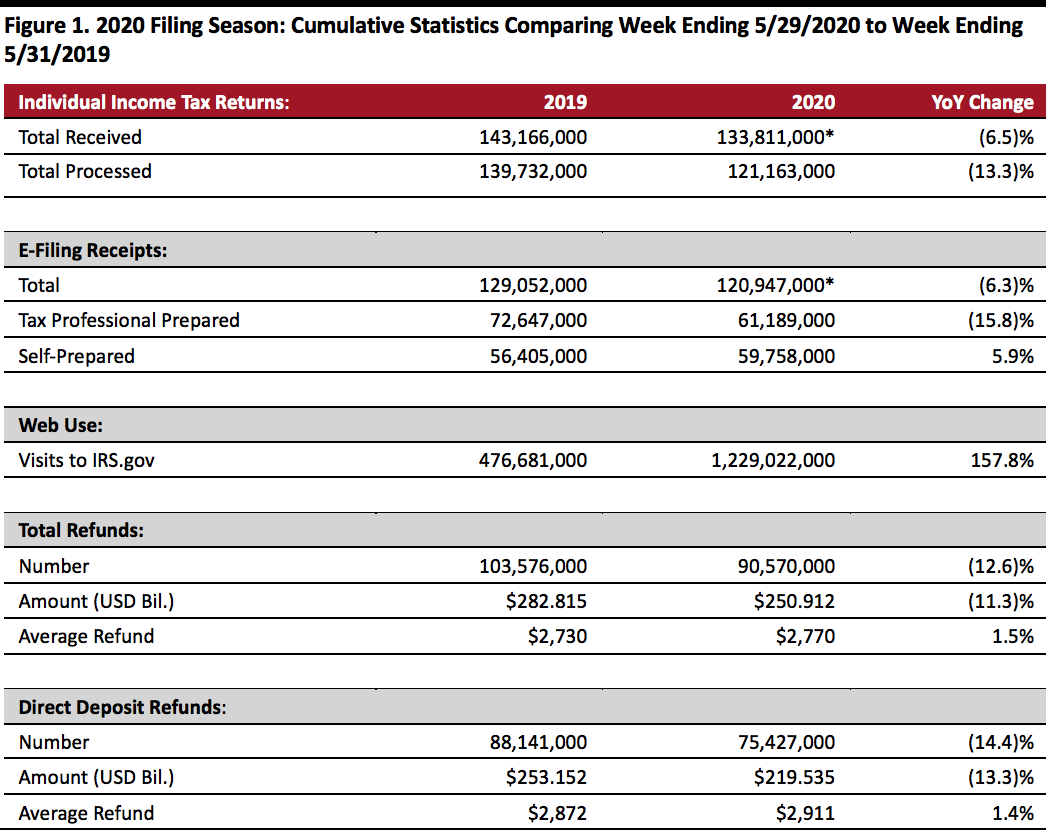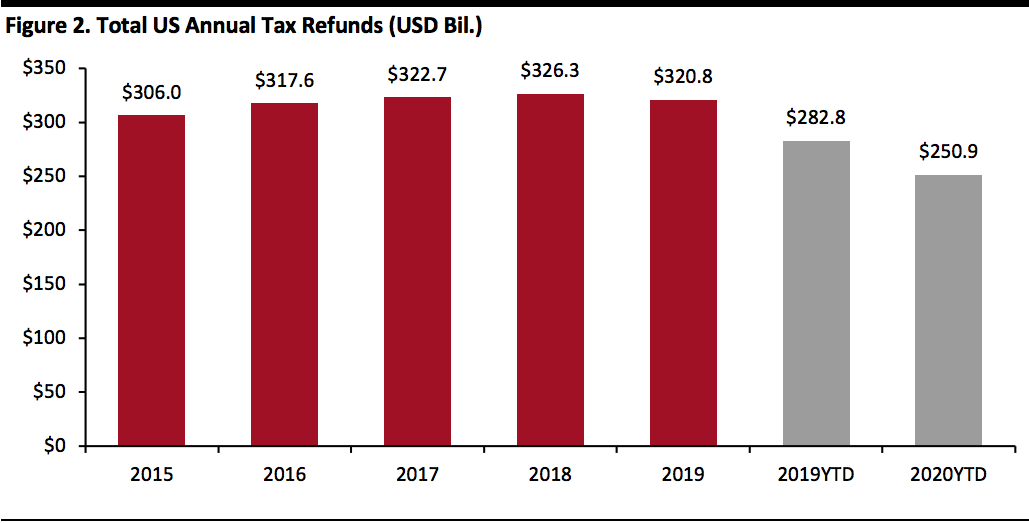Nitheesh NH
Each year, the IRS reports tax return filings and refunds on a weekly basis, starting at the end of January until the April 15 deadline. This year, in response to the ongoing coronavirus outbreak, the US Department of the Treasury (of which the IRS is a division) announced that the deadline to file (and more importantly, to pay) has been extended to July 15.
In this report, we look at what happened in the 18th week of the 2020 tax filing season.
As of May 29, 2020:
 *Includes returns filed to obtain Economic Impact Payments by those who would not usually file income tax returns
*Includes returns filed to obtain Economic Impact Payments by those who would not usually file income tax returns
Source: IRS[/caption] The graph below shows total refunds increasing at a 1.2% CAGR during 2015–2019. [caption id="attachment_111059" align="aligncenter" width="700"] Source: IRS[/caption]
Economic Impact Payments
The IRS released updated figures on Economic Impact Payments, announcing that nearly 159 million Americans have received stimulus checks totaling almost $267 billion as of June 3, 2020. The federal agency added that 120 million Americans received payments by direct deposit, 35 million by check and around 4 million in the form of pre-paid debit cards.
The IRS had previously announced that 152 million Americans had received stimulus checks worth over $258 billion as of May 22, 2020, with California receiving the highest number of payments at 16.9 million.
The stimulus checks are part of the $2.2 trillion CARES Act signed into law by President Trump, which is aimed at providing economic relief in response to the coronavirus crisis. Eligible taxpayers who filed a tax return for either 2018 or 2019 will receive a stimulus payment of up to $1,200 for individuals—or $2,400 for married couples—and up to $500 for each qualifying child under the age of 17. The CARES Act earmarked $300 billion in payments to individuals plus another $250 in supplemental unemployment benefits.
Source: IRS[/caption]
Economic Impact Payments
The IRS released updated figures on Economic Impact Payments, announcing that nearly 159 million Americans have received stimulus checks totaling almost $267 billion as of June 3, 2020. The federal agency added that 120 million Americans received payments by direct deposit, 35 million by check and around 4 million in the form of pre-paid debit cards.
The IRS had previously announced that 152 million Americans had received stimulus checks worth over $258 billion as of May 22, 2020, with California receiving the highest number of payments at 16.9 million.
The stimulus checks are part of the $2.2 trillion CARES Act signed into law by President Trump, which is aimed at providing economic relief in response to the coronavirus crisis. Eligible taxpayers who filed a tax return for either 2018 or 2019 will receive a stimulus payment of up to $1,200 for individuals—or $2,400 for married couples—and up to $500 for each qualifying child under the age of 17. The CARES Act earmarked $300 billion in payments to individuals plus another $250 in supplemental unemployment benefits.
- The IRS had received 133.8 million tax returns and processed 121.2 million. The number of returns received were down 6.5%, while those processed slid by 13.3%. The number of tax filings is lower year over year as taxpayers take advantage of the 90-day filing extension granted by the IRS due to the coronavirus crisis.
- Of the returns filed already, 90.4% were filed electronically. Of those, 50.6% were prepared by tax professionals, and the remaining 49.4% were self-prepared.
- With the IRS temporarily closing all Taxpayer Assistance Centers and suspending all in-person customer services nationwide, a high number of taxpayers used the IRS website for information: The site logged about 1.23 billion visits, up 157.8% year over year.
- A total of 90.6 million refunds had been issued as of May 29, totaling $250.91 billion and averaging $2,770 each. The number of refunds issued was down 12.6%, and the total amount refunded was down 11.3%, year over year. However, the average refund grew 1.5% year over year.
- Of those refunds issued, 83.3% were paid using direct deposit. The average direct deposit refund was $2,911, up 1.4% year over year.
 *Includes returns filed to obtain Economic Impact Payments by those who would not usually file income tax returns
*Includes returns filed to obtain Economic Impact Payments by those who would not usually file income tax returnsSource: IRS[/caption] The graph below shows total refunds increasing at a 1.2% CAGR during 2015–2019. [caption id="attachment_111059" align="aligncenter" width="700"]
 Source: IRS[/caption]
Economic Impact Payments
The IRS released updated figures on Economic Impact Payments, announcing that nearly 159 million Americans have received stimulus checks totaling almost $267 billion as of June 3, 2020. The federal agency added that 120 million Americans received payments by direct deposit, 35 million by check and around 4 million in the form of pre-paid debit cards.
The IRS had previously announced that 152 million Americans had received stimulus checks worth over $258 billion as of May 22, 2020, with California receiving the highest number of payments at 16.9 million.
The stimulus checks are part of the $2.2 trillion CARES Act signed into law by President Trump, which is aimed at providing economic relief in response to the coronavirus crisis. Eligible taxpayers who filed a tax return for either 2018 or 2019 will receive a stimulus payment of up to $1,200 for individuals—or $2,400 for married couples—and up to $500 for each qualifying child under the age of 17. The CARES Act earmarked $300 billion in payments to individuals plus another $250 in supplemental unemployment benefits.
Source: IRS[/caption]
Economic Impact Payments
The IRS released updated figures on Economic Impact Payments, announcing that nearly 159 million Americans have received stimulus checks totaling almost $267 billion as of June 3, 2020. The federal agency added that 120 million Americans received payments by direct deposit, 35 million by check and around 4 million in the form of pre-paid debit cards.
The IRS had previously announced that 152 million Americans had received stimulus checks worth over $258 billion as of May 22, 2020, with California receiving the highest number of payments at 16.9 million.
The stimulus checks are part of the $2.2 trillion CARES Act signed into law by President Trump, which is aimed at providing economic relief in response to the coronavirus crisis. Eligible taxpayers who filed a tax return for either 2018 or 2019 will receive a stimulus payment of up to $1,200 for individuals—or $2,400 for married couples—and up to $500 for each qualifying child under the age of 17. The CARES Act earmarked $300 billion in payments to individuals plus another $250 in supplemental unemployment benefits.